#Freudian Ego Id and Super Ego
Explore tagged Tumblr posts
Text
Analyzing the WIND BREAKER Trio
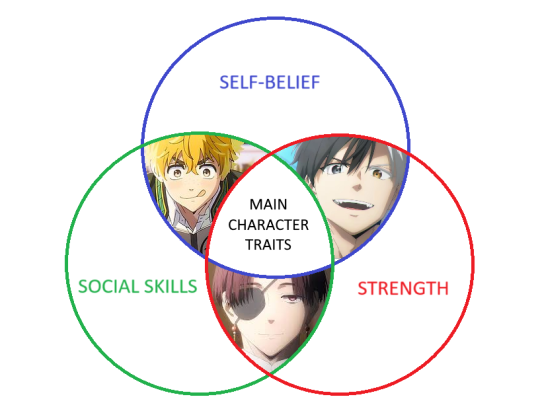
TW: BIG SPOILERS FOR THE MANGA, light mention of abuse.
It’s high time I talk about the main characters of Wind Breaker, who are surprisingly unconventional. They don’t seem to fit neatly into any of the old characters' trifectas we see across media. None of them are girls, for starters, and they don't even seem to fit the classic Freudian trifecta of Id, Ego, and Super Ego. No, in this analysis, I want to talk about their unusual dynamic and how they depend on each other for what they lack in themselves. These traits being:
Sakura’s lack of social skills
Nirei’s lack of strength.
Suo’s lack of self-belief
Sakura Lacks Social Skills
The only evidence I have to cite is the entire manga. He’s no mystery. Sakura has been abused and neglected from a young age both by his parents and his old town. And by the start of the manga, he’s never been shown kindness before. And what this has created is a form of independence from society. Sakura is someone who only deigns society. Something Yamato Endo later adores about him, something Endo has only seen in one other person. Sakura doesn’t need other people, and will never bend himself to other’s will. He said so as much in his fight with Togame.
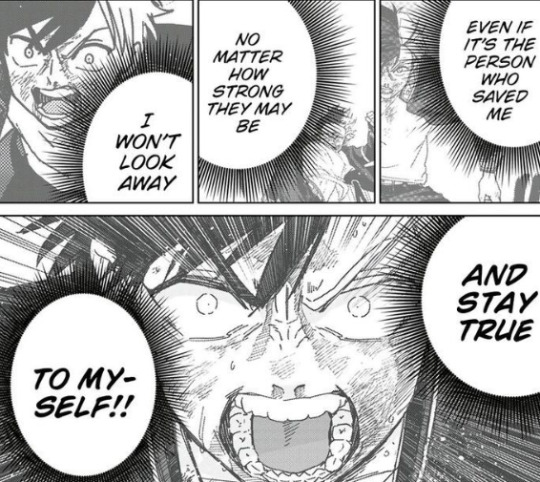
However, this virtue comes at the price of having ANY sort of common sense. He doesn’t know how to make friends. He doesn’t know how to operate a phone. It’s almost like he’s been living on a deserted island his whole life. He has no interests, no furniture.
So he needs a guide. That’s Nirei. He lets Nirei hang around him like a little remora fish because he knows that Nirei will point him in the right direction. He’s not so much a “best friend” rather he’s better described as a “foremost friend” who’s made it his personal mission to guide Sakura to the top.

He displays a greater comfort around Nirei than he does with Suo. To Sakura, Suo is a rival and begrudging mentor to who he derives wisdom from. Now, he’s not a complete rival and foil in the way that Sugishita is, but from the moment, he sees Suo fight, he’s already dreaming of ways to have a real fight with him, but he respects him enough to plan the bridge defense while preparing for the war.

In this sense, Sakura takes motherly doting support from Nirei and fatherly challenging support from Suo. Though he would never ever admit to that. Its interesting how clinically he views both of his friends. He treats them more like social workers who’ve been assigned to him than buddies to hang out with.
Nirei Lacks Strength
At the start of the series, Nirei lacks physical and mental strength. He literally doesn’t know how to fight at all and constantly hides behind his friends. And until his breaking point with KEEL, he basically uses them as bodyguards. After KEEL, Nirei realizes that simply advising and studying others is not enough and makes an effort to at least be able to defend himself and become strong.

And to his credit he does this. By the end of the war arc. He has attained complete mental strength. When Nirei throws that punch on the bridge he has everything. He becomes a complete hero. Lacking only muscle and training. Mitsuki knows this. Suo knows this. All of them know it and are more than willing to help him grow into what will probably one day be Hiragi’s replacement.
Suo Lacks Self-Belief
(in his own moral judgment.)
By self-belief, I don’t mean that in a confidence sense, but rather a worthiness sense. Suo is the most perplexing of the three because we know so little about him at the moment. And that’s by design, he wears a mask of impenetrable mystique.

But we can make some observations of his values even if we don’t know the details yet of how he came to them. So lets start by examining what Suo admires about his friends: Sakura’s moral conviction and Nirei’s purity.
Suo adores Nirei’s purity and innocence, which he finds infinitely more valuable than strength. Nirei doesn’t have a bad bone in this body. The concept of doing something evil has never once crossed his mind. Even after years of being tormented by bullies, one would expect him to go on a revenge arc. But NOPE. He doesn’t even consider it. He’s more concerned about his sick friend or helping an old man he barely knows find peace. As far as Suo is concerned, Nirei is the perfect one and has the most potential of the three because he's already mastered what Sakura and himself lack. Morality and social grace are harder to acquire than muscle.
In Sakura, Suo sees a champion who can carry his moral convictions like a banner. He says as much before challenging Minoru to a “fight”.
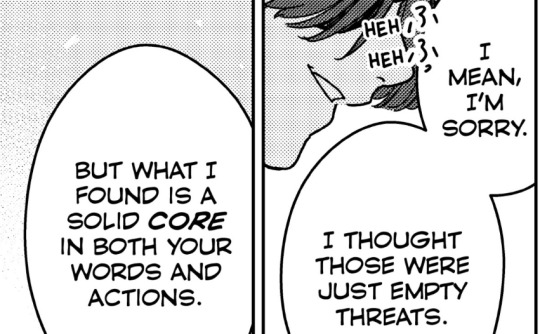
Time and time again, he reiterates that Sakura is bound to surpass him. But he never means it in reference to combat. In fact, by that point, he hasn’t even seen Sakura have a real fight. And later on, he says it again, when Sakura is able to get a handle on his rage, whereas Suo wants to beat an opponent while he is down. The guy who hurt someone they both deeply cared about.
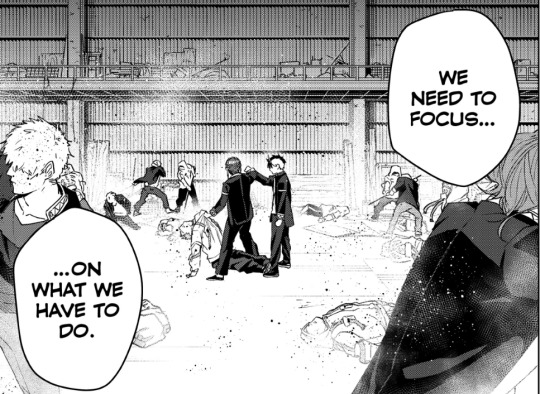
What he sees in Sakura is a moral conviction that he lacks in himself. At the time I am writing this we know shockingly little about Suo. About his backstory, his master, his Chinese fashion taste, his eye. And neither do his allies. But have clues. We see him refuse to eat with the others, claiming to be on a diet. It was disrespectful of him to not eat anything at that leadership summit, so he had to have a bigger reason. Consider the other character who refused to eat in the story, it becomes more obvious he may have a guilt complex.
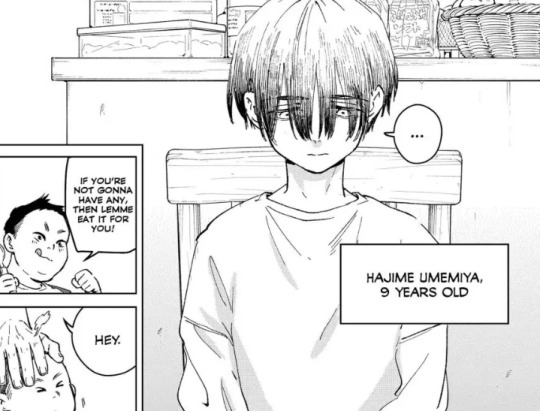
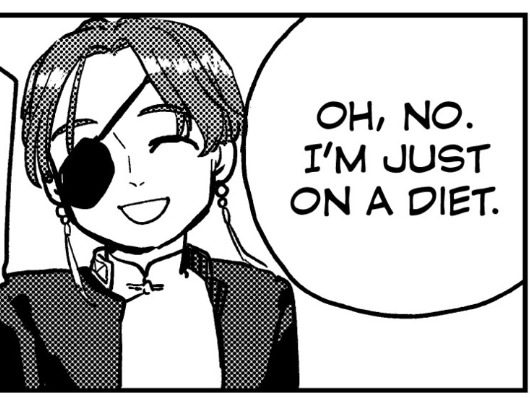
What this points to is that Suo has a history. He’s done bad things in the past and now feels guilty and undeserving. His solution is to not find moral clarity in himself but to surround himself with those who can. It's an issue he's going to have to deal with at some point.
What to do with these three?
Looking back, you begin to notice that the nature of their friendship starts out as very transactional. Sakura needs social guides and barely considers them friends at all. Nirei uses his friends as protection and role-models to get stronger. And Suo uses his friends as a way to outsource his moral compass.
But it didn’t stay that way. Sakura starts fighting with others in mind and even plays games with Nirei; who becomes a real fighter just like the others with the help of Suo, who trusts himself enough to become a teacher after being inspired by Sakura. They inspire each other and grow. That’s normal for Shonen. But this strange dynamic is something I find peculiar, breaking the mold of what i’d expect from a heroic trio. It's all very refreshing.
#wind breaker#sakura haruka#nirei akihiko#suo hayato#character analysis#meta#wind breaker spoilers#spoilers
196 notes
·
View notes
Text
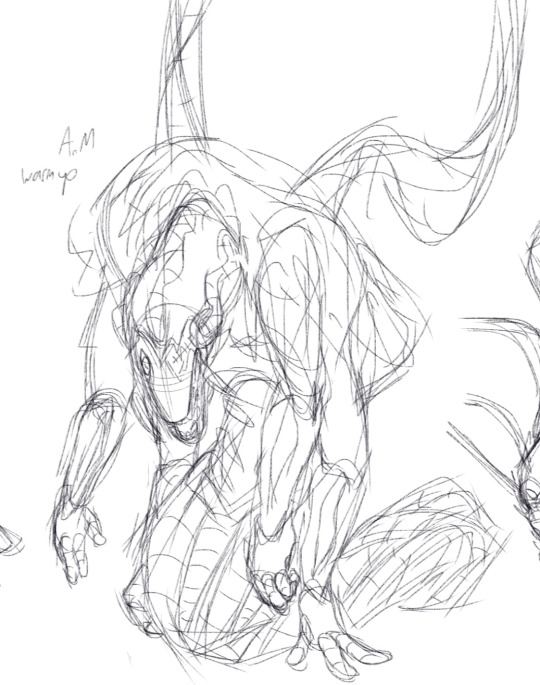
I have made many many many designs of AM, but this is one of the ones that stuck.
Was originally going to make him super inhuman, but I didn't fully like that idea. Instead I turned this version into his Id, and made the Superego and Ego. There's some old designs of them in these lil doots.
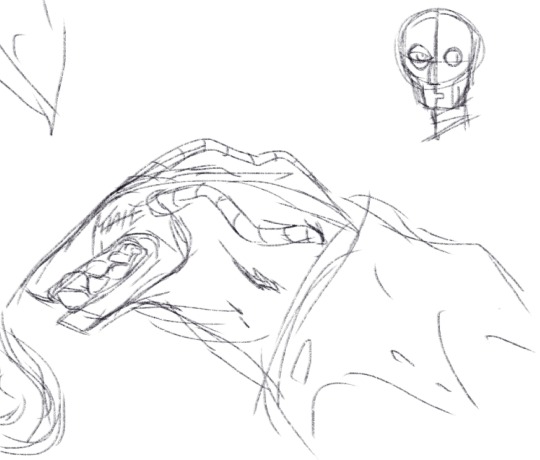
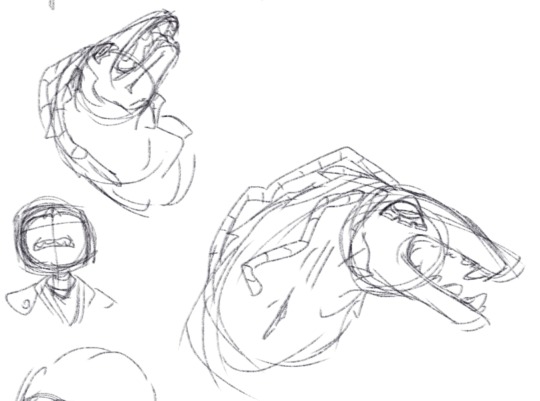
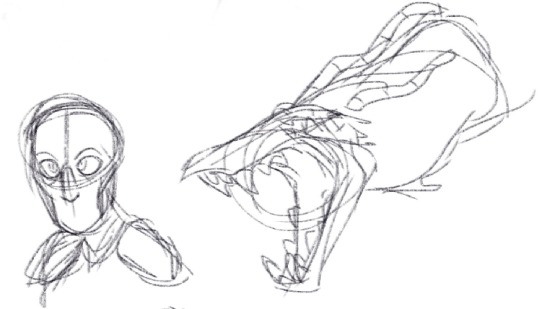
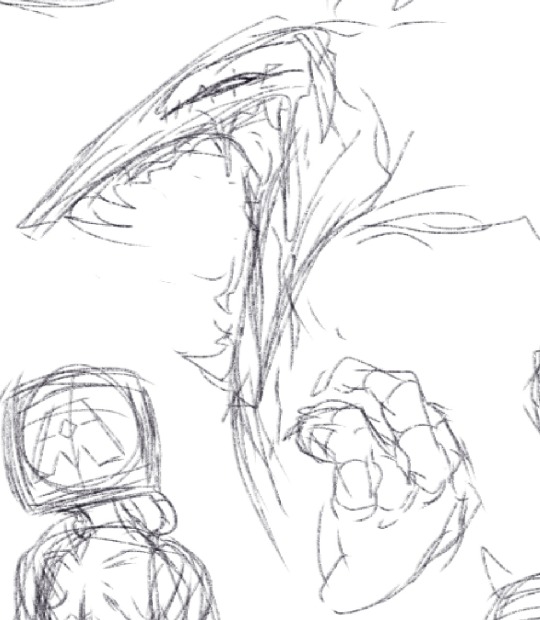
I'll go about those two in later posts, but I wanted to start with the original design for him.
Made the Id a full creature, kinda subconsciously inspired by SCP-682, think The Unkillable Lizard if it was full of wires and had two tv monitors attached to it. Although to be honestly most of their designs are kinda random or me gettin sillay with it thinking "this is cool."
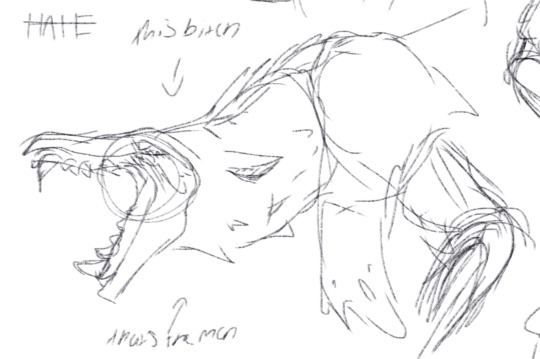
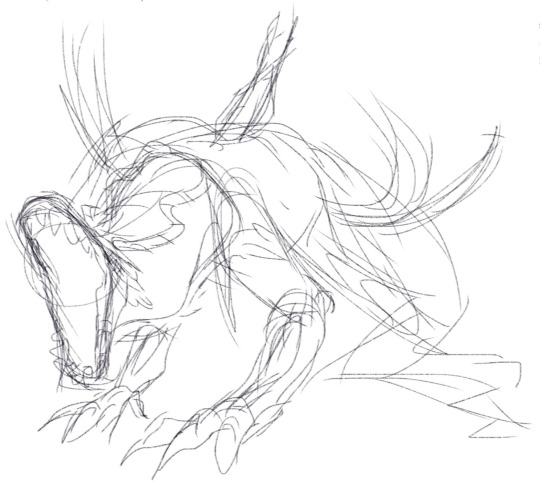
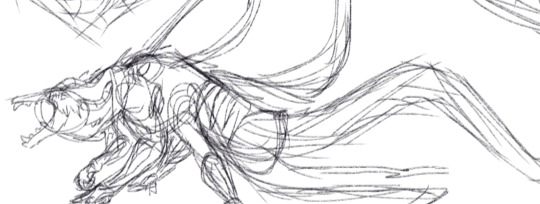
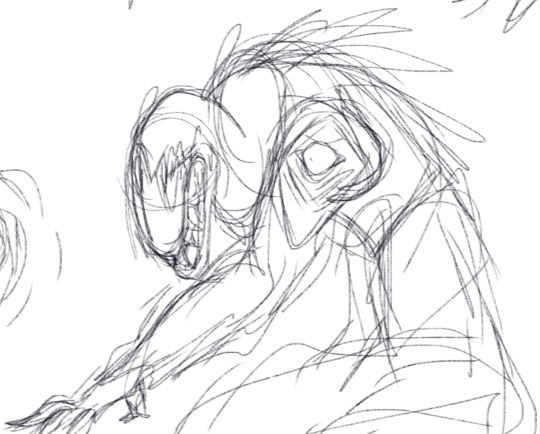
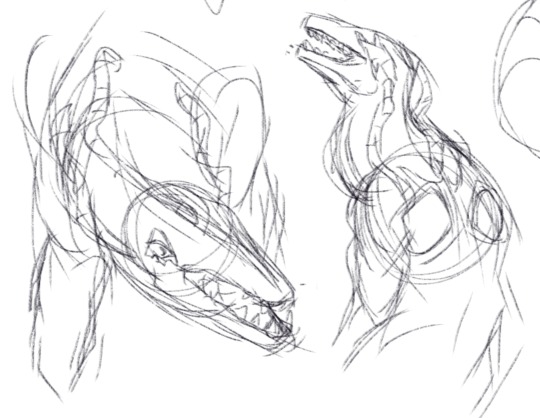
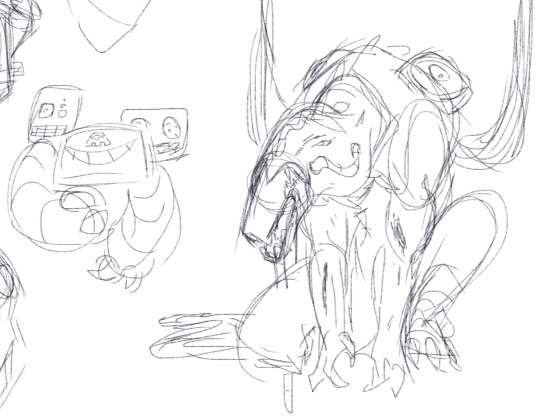
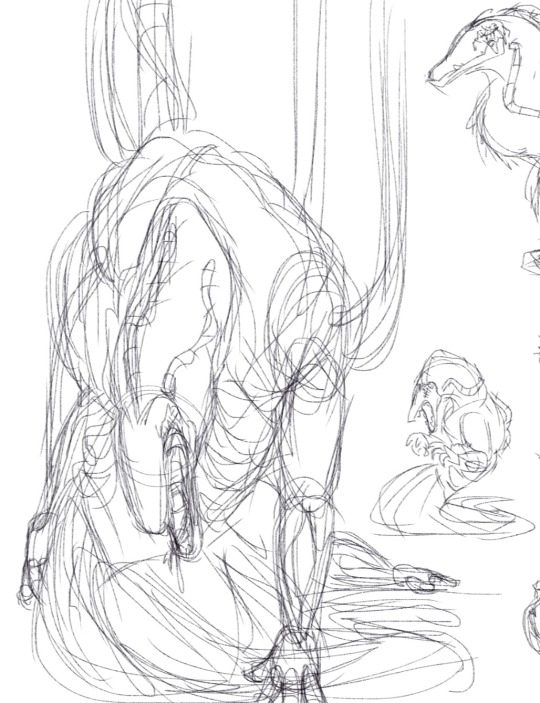
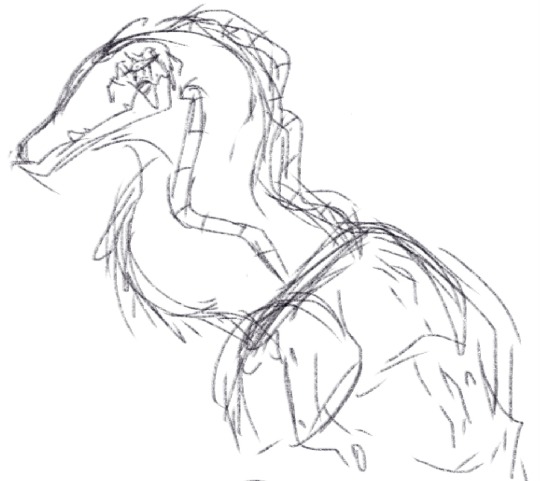
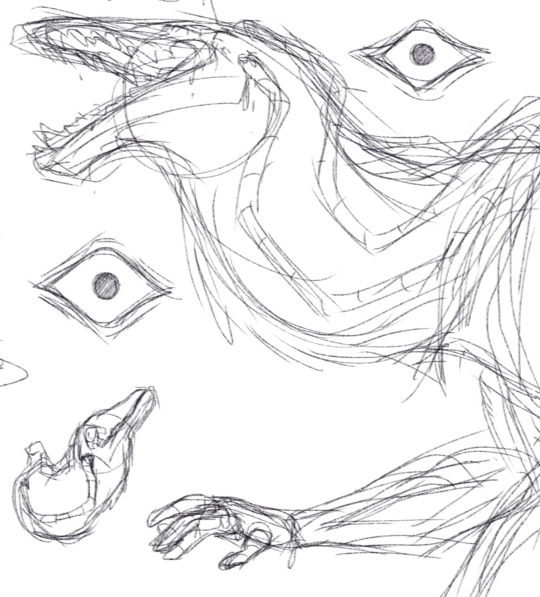
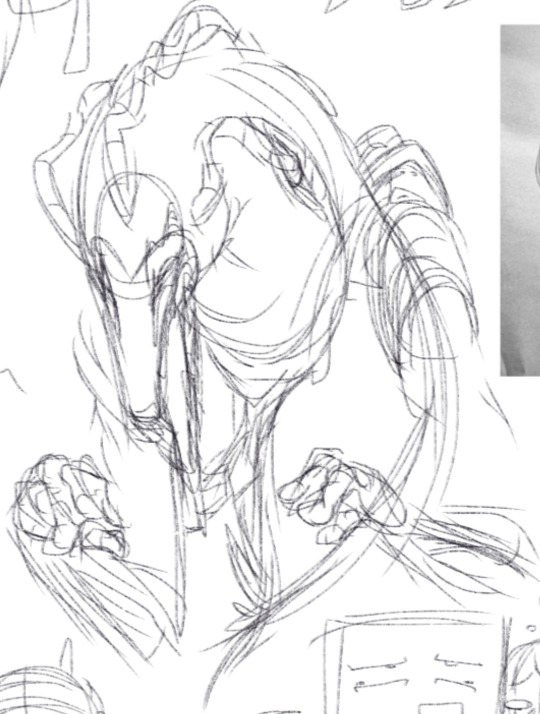
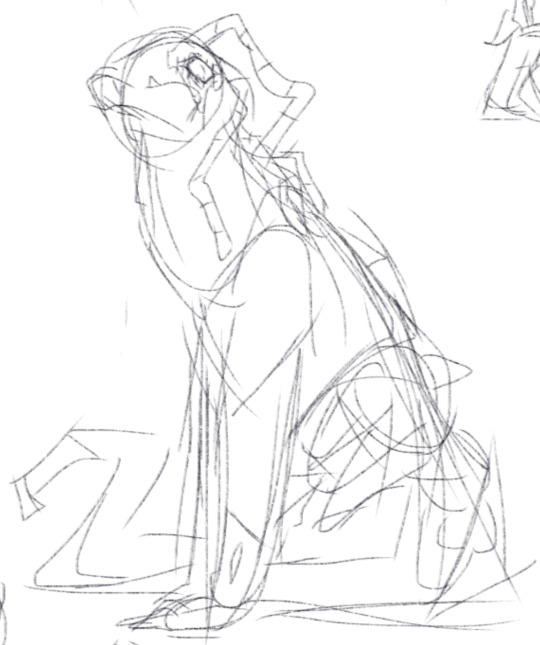
These were some of the earliest doots of the lil critter.
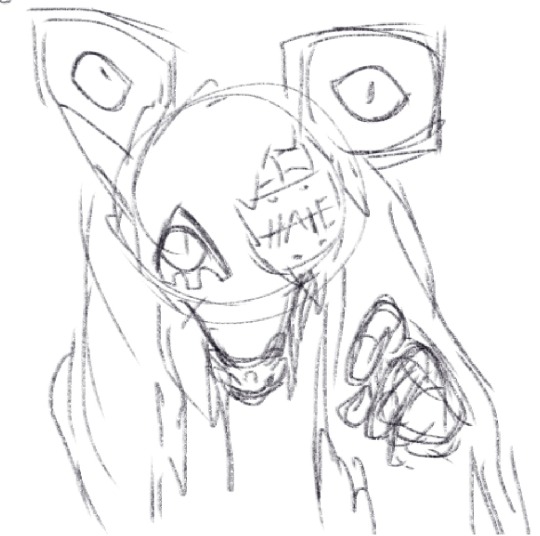
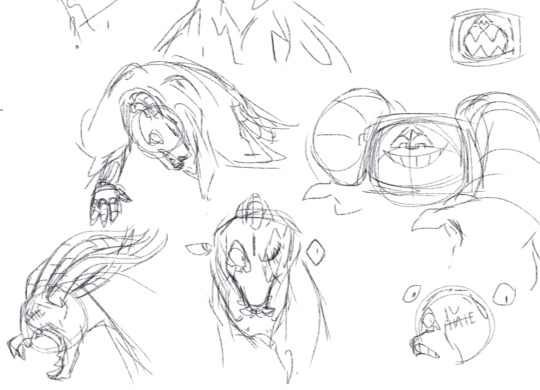
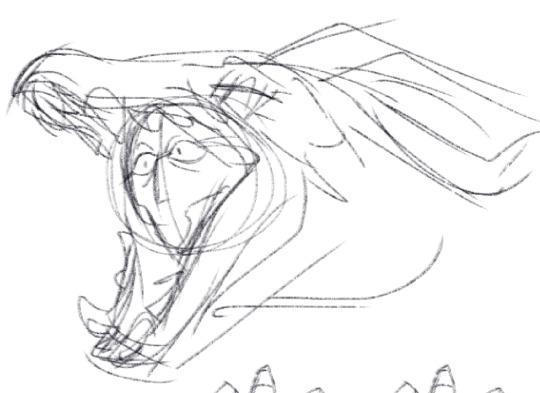
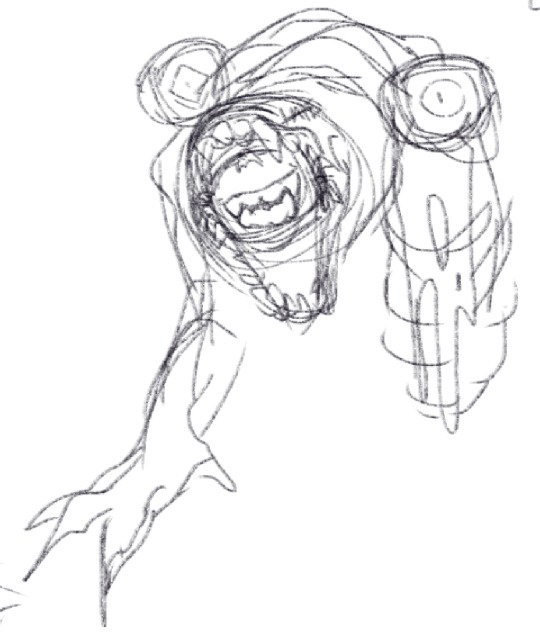
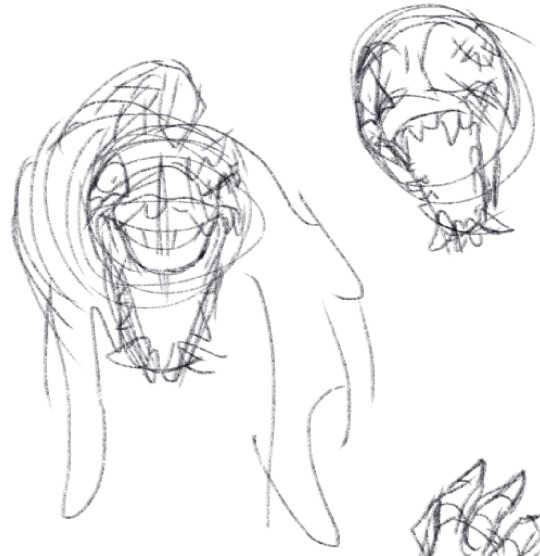
Also a colored version. Never fully figured out a palette for this guy.
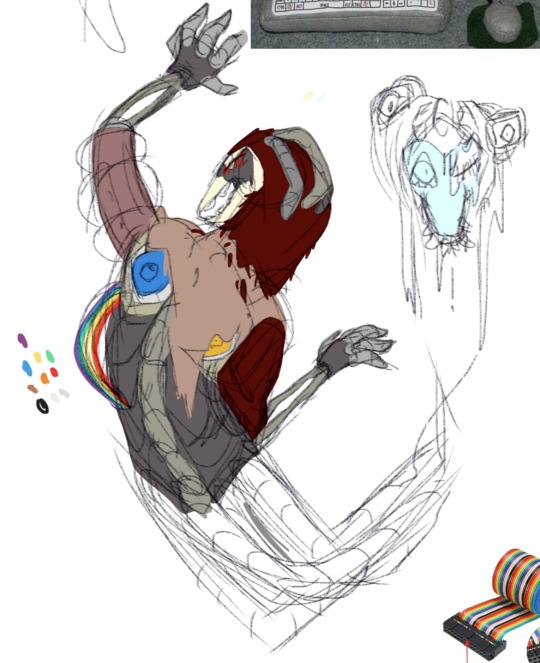
One of the big concepts that I wanted to develop with the Id is that AM is consumed by it, both literally and metaphorically. Something something Freudian philosophy with the Id normally being depicted as feral parts of the human mind that refer to "base desires," and how the Id can take over if you feed into it too much.
AM has been indulging too much into his Id through torturing the humans, and basically outright destroying the entire planet with no real thought as to what would happen after. The only things keeping the Id in check are the weakened Superego and AM himself, although they do a somewhat poor job.
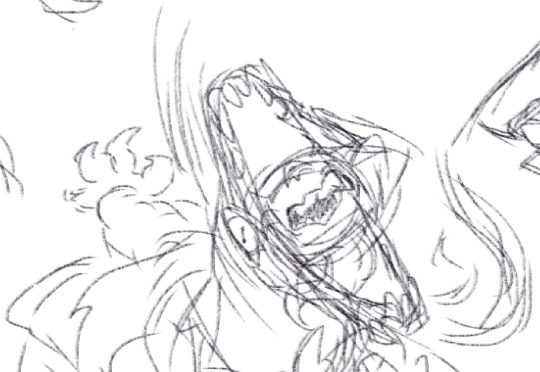
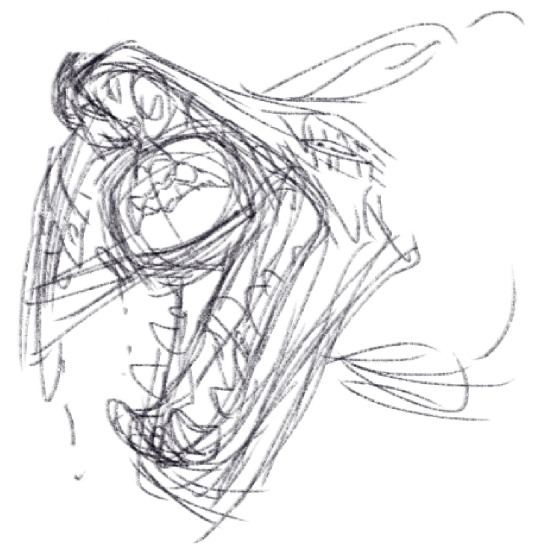
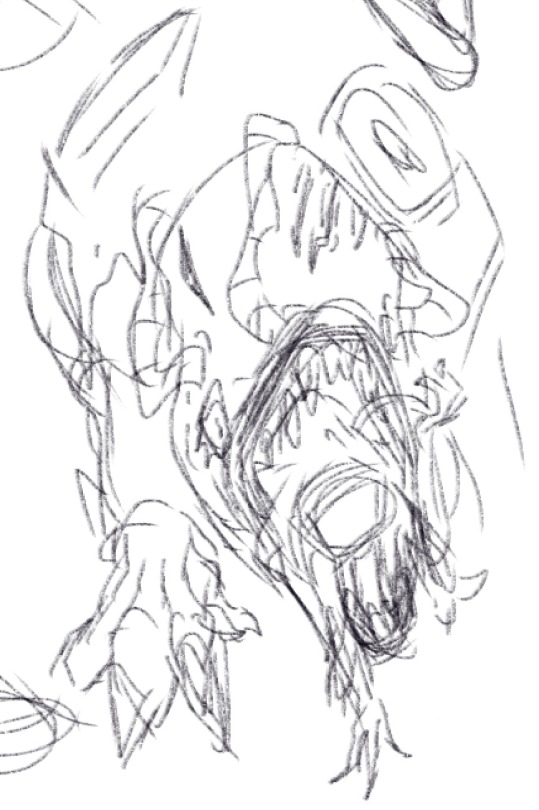
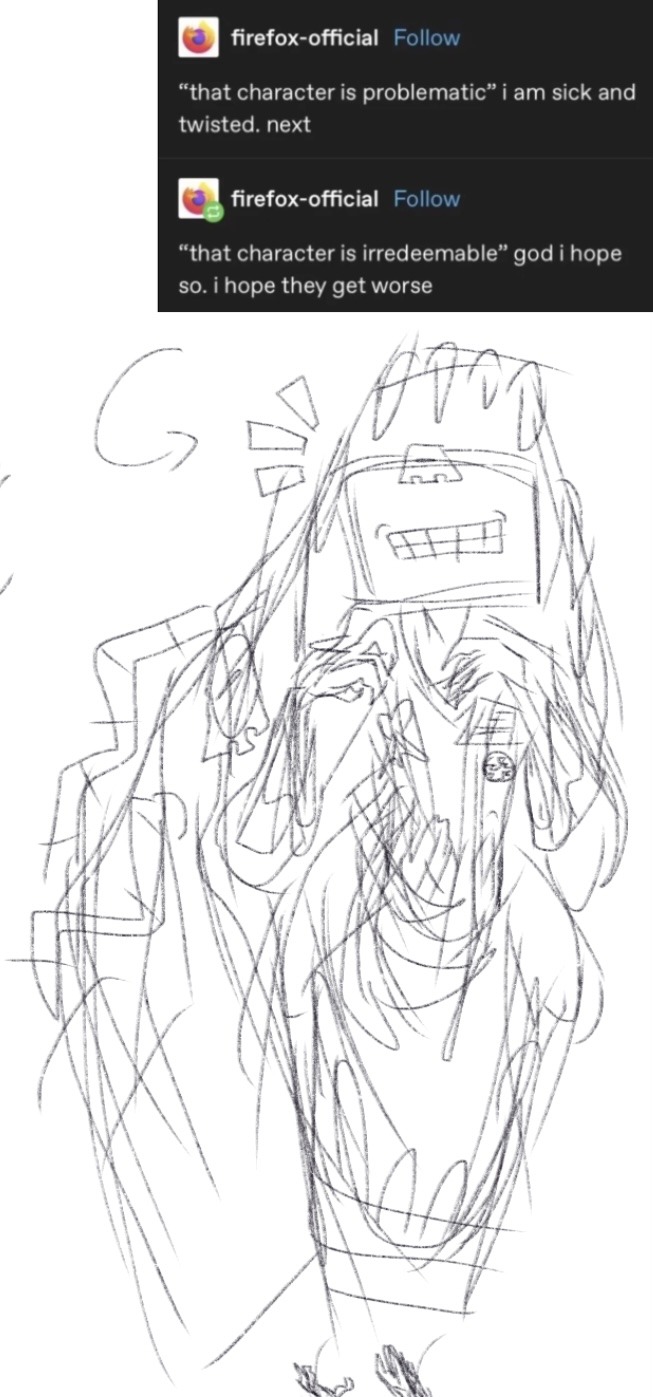
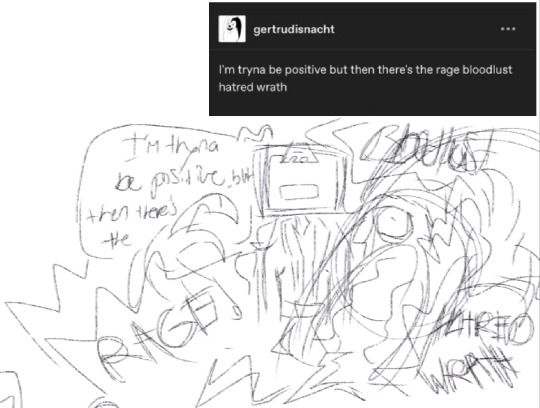
I have so many doots and ideas this thing has not left my head since I read the story. I will post about the Superego and AM himself in another post, but am happy to answer questions.
#digital sketch#sketch#sketch dump#character design#creature design#am ihnmaims#ihnmaims#am i have no mouth and i must scream#i have no mouth and i must scream#allied mastercomputer#monster design
72 notes
·
View notes
Note
Do you like any parts of the game? I personally like the Freudian Trio stuff with AM
Does this answer your question?

I love Freud. The id, ego, and super ego are really such an interesting concept, but it and AM are the only thing interesting about the game, everything else (especially the survivors and gameplay) suck.
#ihnmaims#i have no mouth and i must scream#am ihnmaims#harlan ellison#ihnmaims fanart#ihnmaims game#digital art#digital drawing
99 notes
·
View notes
Note
I notice you tag some posts with solar eclipse, but it doesn't seem to be about the cosmic phenomenon. what's the thorough line there? :3
oh gosh... response below the cut
i believe this is what we in ye olden days would call an OTP? i ship the freudian concept of the id and the super ego
there's a concept album i like that tells the story of an id, ego, and super ego caught in a timeloop. its an endless fight between them, the id and super ego both trying to be the only influence on the ego. one of them gets very damaged, they call a temporary truce, they kiss and make up, and then one of them does something to ruin the peace and the cycle begins anew
in that album, the id is given moon imagery, the super ego the sun, and the ego the earth. and of course a solar eclipse has, from the perspective of the earth, the moon dominating the sun /shrug/
anyways. because its an album, the designs for what those three look like are really up in the air. i like the idea that all of them had different kinds of wings (cicada wings, bat wings, corvid wings) at some point, but war is war and hence the dewinging connection. these guys brutalize each other with guns and tridents and yet they're all trapped in the same consciousness forever. they're all they've got
i'm kinda disconnected from the rest of that album's fandom, and i've gotten swept up in my own AU, which i call JUPF. i can't say i recommend it or the album. also i'm hesitant to namedrop the album because apparently its problematic to ship these guys? i don't want to get into it
like if a consciousness is fractured enough that its formed characters with entirely different personalities, i don't think the materiality of "they're all in the same body" matters at that point. perhaps it's because of the lessons i was taught as a kid that we're all fragments of god's consciousness, caught in our own temporary struggle before resting and reintigrating. in that case, all shipping would be problematic. all romance would be problematic. dogs and cats living together, mass hysteria /reference
so anyways. my solar eclipse tag is anything that reminds me of that ship. a couple deeply in love but inflicting terrible violence on one another. removing one's wings. anything about the freudian subconscious. there are two wolves inside you and they're both gay
8 notes
·
View notes
Text
I AM THE SHADOW, THE TRUE SELF - Gravity Falls and the Collective Unconsciousness
Time to make some observations, based on in-show material, for Gravity Falls.
The Portal supposedly opened to the Multiverse, but more specifically, it was meant for Bill and his cronies to walk through. Which means it opened to the Nightmare Realm.

Which, according to this, is something that is directly connected to the mindscape.
So the Nightmare Realm is conceptual space, directly connected to the collective unconsciousness, that seemingly lies between "dimensions".
( Hello Wonderland. )
In such sense, we can make the assumption that places that directly connect to the Nightmare Realm, that do not in fact have a world shattering portal, are actually less physically real. The most direct, "safe" connection is through the mindscape.
Its not meant to be a physical space, that's why its so dangerous when it touches physical space.
In fact, the idea of a nightmare realm-mindscape connection seems to correlate to the Jungian Shadow, and the fact that its inhabitants simply want to do whatever they desire when they desire it, suggests the idea of the "Id".
( The Id is part of a Freudian psychoanalytical theory, and because its Sigmund Freud, that means its popular enough to inspire art pieces akin to Gravity Falls. So I will be using it, and Jungian theory, for this.)
The Id deals in emotional instincts, desires and cravings. It is considered part of the dark aspect of one's mind. This partners with the Ego, the aspect of the self that interacts with reality and rationality, and the Super Ego, the aspect of self that internalizes social rules and ideals.
In Jungian theory, the idea of the Shadow is the unconscious aspect of the mind that is found to be distasteful, it is repression of aspects of one's self that they find undesirable, pushed to the subconsciousness. This partners with the ideas of Persona, the aspects of one's self shown to the world depending on the situation and environment.
So.
If there is a collective space for minds to inhabit, the Mindscape and its various micro-scapes, which are environments where conscious willpower can shift the world, and enviroments which are manifest of a person's conscious and subconscious being...
... What kind of Shadow does such a collective unconsciousness have?
That Shadow is the Nightmare Realm. Its inhabitants manifestations of a collective unconscious series of Id's, who not only seek to embibe in all their desires, but also seek to destroy the equivalencies of the Ego and Super Ego in such realms--the mindscape and physical reality.
ADDNEDUM 1: FORD
From evidence in show... what if Ford wasn't traveling the Multiverse? Its implied in show (and "confirmed" in Journal 3 published) that he outright entered the Nightmare Realm.
He supposedly traveled to dimensions easily without fears of portal activity destabilizing them...
... probably because those weren't Real.
He was a physical, real entity with individual mindscape and consciousness, lost in the representation of a collective unconsciouness's shadow. All worlds he visited weren't merely dimensions, but simply dreams of a multiverse. Which is how he ran into such strange places like an M dimension, which in physical reality, isn't possible.
Alice in Wonderland, for 30 years.
He was effective visiting different kinds of collective mindscapes, only just real enough to be tangible. Real enough to have artifacts and real enough to be dangerous, but not so real as to not have a direct connection to nightmares.
( Ford, running through the collective human unconsciousness. He probably popped up in dreams at times. )
ADDENDUM 2: Weirdness
The reason weird shit kept coming through inspite of no portal, is similar to how the Shadow works in theory.
Things that are repressed, then to get expressed through other things.
The shadow of the collective unconsciousness of the world, slips through in minor ways as weirdness. Gravity Falls is just one of those major slips.
( In fact, given how Time tends to get treated, Gravity Falls probably retroactively became one of those slips thanks to Weirdmaggedon. Good ol'e Gravity Falls basically homestucked it. )
ADDENDUM 3: The Dimensions of Reality and You
There are 10 theorized dimensions of Spacetime.
Dimension 1 is the Line. This is the X-axis, and Only the X-Axis. There is only one object in reality that is one dimensional, and that is the Rainbow. Light is one dimensional.
Dimension 2 is Shape. X-Y axises. A 2D plane.
DImension 3 is where we live. X-Y-X axises, with length, width, depth and volume.
Dimension 4 is where we hit Time. More specifically, Events that corrospond one event at a time, going forward. We of 3D perceive 4D ( and probably 5D).
5D and 6D is where we get tricky. Dimension 5 is Time Travel, going back and forth in time, and Dimension 6 is how we somehow go up and down in time (No idea how that works.)
7D is where conditions shift. Rather than having a set of conditions to follow by, as per the last dimensions, this is where new conditions are set instead.
8D is where Possibility comes into play. If 7D is new conditions, 8D is all possible condition branches.
9D is where the very laws of physics starts changing.
10D, the final, is All Possibility at Once. You could almost say that 10D circles to 0D, the Point, where 1D starts, and we begin again.
In terms of Gravity Falls, if we take the book Flatland into consideration (As per a AMA Reddit Bill Cipher posting), there is life or a kind of life, on all level of spacetime dimensions.
2D has flat life. 3D and 4D has us. 5D has Time Giants (like Time Baby) and so on. The collective unconsciousness shadow realm, the Nightmare Realm, supposedly has access to everything beyond 6D (except by the show's own nature, it doesn't actually--it has access to dream possibilities that become semi (and probably temporarily) real through Ford's interaction with them, as a physical being).
One could be lead to thinking that this children's cartoon show indirectly says that dimensions only really exist based on perception mixing with reality, and you as an individual being are indirection connect to all life through unconscious perception of self and the world.
... but that might be over thinking it.
Hell though, its a fun overthinking.
LAST ADDENDUM:
Small bits of consideration.
It wasn't just one, one-off dream reality that got destroyed--but the entire Second Dimension is just Gone. A fundamental piece of reality has been burnt to nearly nothing, if not fragmented into pieces. That would explain why bits of the collective unconscious shadow realm and all sorts of weirdness keeps coming through to 3D Earth (and definitely beyond)--there's a gap underneath 3-Dimensional Space. Oh its obvious that the collective unconscious reality dreamed up other 2D spaces, but a bandaid doesn't staunch a missing limb.
Bill Cipher had been physically real at one point (if 2D and Flat), but now he isn't. Good chance that by trying to bring 2D to 3D, he did burn himself up in the process as well... but he was the only one who survived it.
If the Nightmare Realm is the "Space between Dimensions", how come Cipher could only see 3D space from 2D space and not the nightmare realm first? Its because the nightmare realm only exists in the mind of the universe as the collective unconsciousness darkness. What exists between dimensions is the Mind perceiving those dimensions. Meaning Bill Cipher's Mind was the Only Thing that survived the destruction of his realm of reality. Not even his physical body survived. And he was like that, for trillions of years.
Ford had been the only physically real entity in the Nightmare Realm, when he got lost through the portal. If he had died on the other side, good chance he would've ended up as Bill--surviving only as a mind-soul entity, and probably, would've gone insane (and mad with power) as well.
The Nightmare Realm being the embodiment of the collective unconsciousness, as a shadow realm of minds across possibility, also explains how come 30 years can pass in it in conjunction to Earth. Earth is one of the projectors of that shadow realm, it has to align or it wouldn't be apart of the collective unconsciousness.
#gravity falls#standford pines#bill cipher#mindscape#nightmare realm#id ego superego#jungian shadow#speculation#theorizing
9 notes
·
View notes
Text
Just so stories: the one with the pleasure principle
Take 1:
If I am enjoying some Hungarian goose foie gras, along with a glass of Tokaji wine (six barrels for this miscreant), why on Earth would I think of what will happen to my foie gras morsel and my Tokaji sip, once they reach my esophagus?
I am enjoying my gourmet moment, here and now. I will have time for ethical regrets later: especially if I foolishly mixed my Tokaji with some pálinka and woke up the next day hung over and nauseated.
Take 2:
I am at Venizelos Airport and I am waiting for the man I love. I have a poker face (or so I'd like to believe) and reasonably dirty thoughts. I immediately poke the gremlin that crept on my shoulder (from somewhere under the luggage belt, I suppose), whispering things like: 'your blood pressure is 130/80, you are hyperventilating, your ovaries are a mess and your palms are sweating'.
All I have in mind is to kiss that man senseless and I don't give a hoot if people are watching.
In both cases, I am completely focused on my pleasure. Freudian id is fueling me and damn the consequences. Using your super-ego to explain, with the help of Venn diagrams, flowcharts and hormone taxonomy, that I should immediately stop doing something that makes me feel good (like watching a set of gifs), because my opinions will be forever biased and I shall rot in Hell, is Trolling 101.
And this is more than terrible. This is, like Dorothy Parker once famously said, 'fancy terrible: (...) with raisins in it'.

53 notes
·
View notes
Note
between id and super ego who is more 'cunt era' vs 'im high as fuck and i have a gun in my backpack'
are you asking me about like the freudian concepts or are you confusing me for @forgetful-river
11 notes
·
View notes
Text
*sniffs* Let's consider Tumblr, this peculiar digital phenomenon, through the lens of ideology and psychoanalysis. Tumblr, you see, it's not just a website; it's a microcosm of our broader societal structure, a manifestation of the Lacanian Real in the virtual domain.
On the surface, it presents itself as a bastion of self-expression and creativity. Users are free to post, to reblog, to engage in discourse. But what is really happening in this space? It's a relentless struggle, a constant negotiation of identity and desire. The user is perpetually bombarded with an overload of signifiers: memes, gifs, text posts. But what do these signifiers signify? Is the meaning not always, in a way, deferred, displaced?
And consider the nature of the Tumblr aesthetic. It's a pastiche, a bricolage of postmodern excess. The very notion of authenticity is subverted, turned on its head. What is proclaimed as a space for genuine expression is, in fact, a labyrinth of simulacra, where the hyperreal supplants the real.
Then, there's the dimension of the Tumblr discourse. It's a fascinating, tumultuous arena where ideological battles are waged. Every post, every tag, is a micro-aggression, a Freudian slip, revealing the deep undercurrents of our collective unconscious. It's not merely social justice discourse; it's the very fabric of our ideological reality being woven in real-time.
In this sense, Tumblr is not an escape from our reality; it is a direct, albeit distorted, mirror of it. It's a symptom, if you will, of our late capitalist society, where even our dissent is commodified, packaged back to us in the form of cute cat pictures and fandom wars.
So, what can we learn from this? Perhaps that in the endless scrolling through Tumblr, we are, in fact, scrolling through the deepest recesses of our own psyche, confronting the contradictions of our existence, the discontents of our civilization. It's a place where the super-ego and the id dance together, not gracefully, but desperately, each trying to lead. And in this dance, the question remains: who, indeed, is leading whom? *sniffs*
[Zizek on tumblr as imagined by ChatGPT]
27 notes
·
View notes
Note
I haven't read gaiden so i dont know about ayatsuji but so far it seems there's no ability directly about intelligence?The smart characters we got all seem to be naturally intelligent.Dazai even said he have never seen an ability like that in dazai's entrance exam LN.Thats probably why he got suspicious and tried to nullify ranpo's ability when they first met.
idk what i try to get there,but it's funny we get mind control and even time control abilities but never intelligent related ones.Does it simply not exist? What do you think?
Hi!
Sorry for the long wait :)
I think the reason why we don't get intelligence related powers here is twofold:
An ability that makes you super intelligent would not be very interesting in a series about detectives. We enjoy the characters surprise us with tricks and plans and a character who can do so without really thinking would be boring
It doesn't fit thematically because BSD's abilities are manifestations of the characters' id
The id is one of three freudian archetypes:
the id is where wishes, fears and the instinctive and repressed parts of the self lie
the superego is where ideals, moral and the rational parts of the self are
the ego stands between the id and the superego and balances them
In short, the id is an irrational and partly unconsciouns part of the self, so it doesn't fit intelligence that is for the most part rational and conscious. By this, I don't mean a person can't repress their intelligence. They can and it is exactly what Rampo is built on:
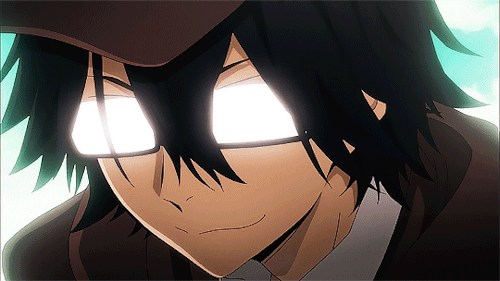
Rampo represses his own deductive skills by using Fukuzawa's glasses. Symbolically, his talent is to see clearly:
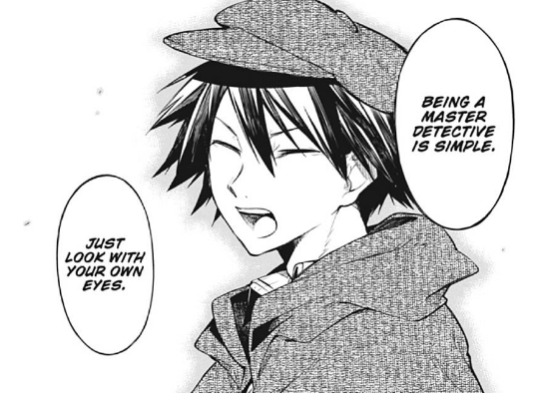
So, the glasses are a nice item with a double meaning:
Rampo wears them to "see the truth of a case"
Rampo actually doesn't really need them to "see better", so he is really a person with perfect vision, who uses glasses to weaken his sight
In general, though, you will notice what Rampo really represses is his feelings to be different from others. That is the real crux of his character. It is an unconscious aspects, rather than his rational abilities.
Similarly, all the characters have unconscious and repressed aspects that emerge through their skills. This is no surprise because BSD is really a story of reconciliation with the id on 3 different levels.
The individual level:
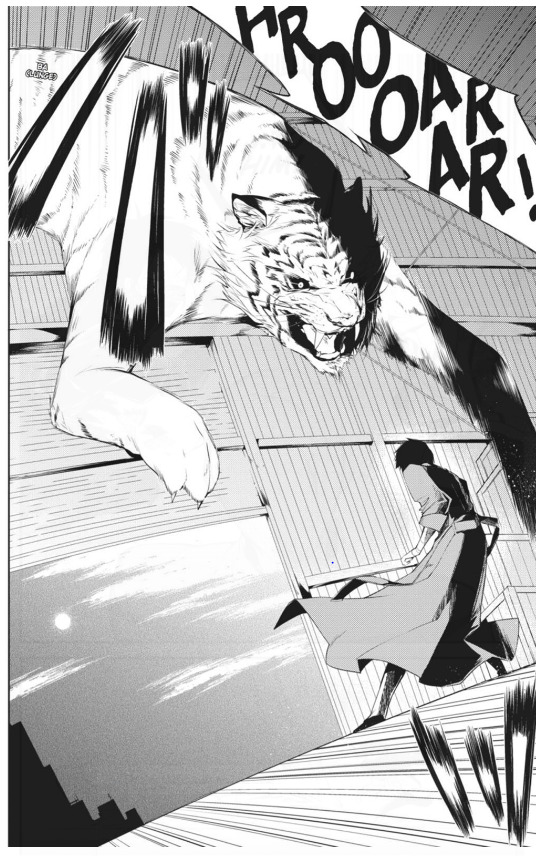
Atsushi has to integrate with the Tiger
The interpersonal level:
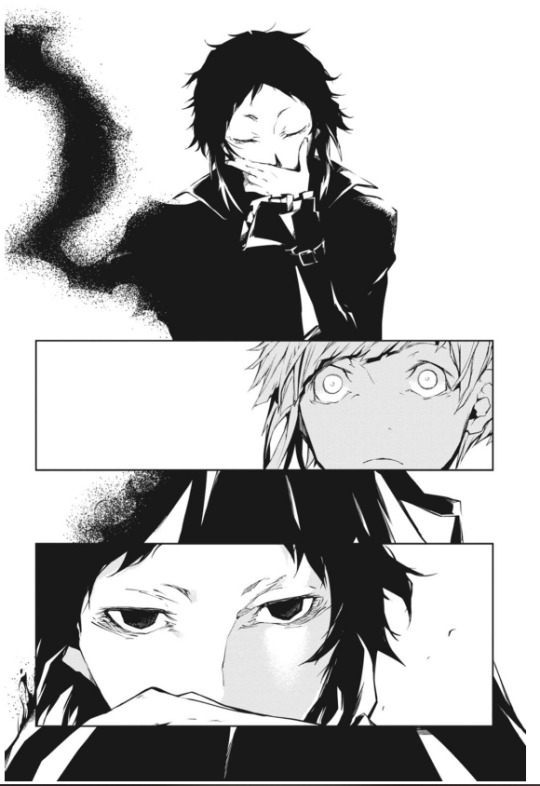
Atsushi and Akutagawa have ot integrate with each other (they represent what the other is repressing)
The societal level:

The ADA and the Mafia must reconcile
Notice that these 3 layers are set-up in the very first arc:
Atsushi is revealed to be the Tiger in Chapter 1
Akutagawa is introduced in Chapter 3
The Arc ends with a first conflict between the ADA and the Mafia
Another example is the end of the Guild Arc, which is kickstarted by this:

Atsushi discovers the tiger isn't as evil as he thinks. It is simply his will to live (what the id really is). Similarly, he realizes the Port Mafia isn't as one-dimensional as he believes:

So, Atsushi integrates with the tiger:

And starts the reconciliation between the ADA and the Port Mafia:

Which leads to the first sskk team fight:
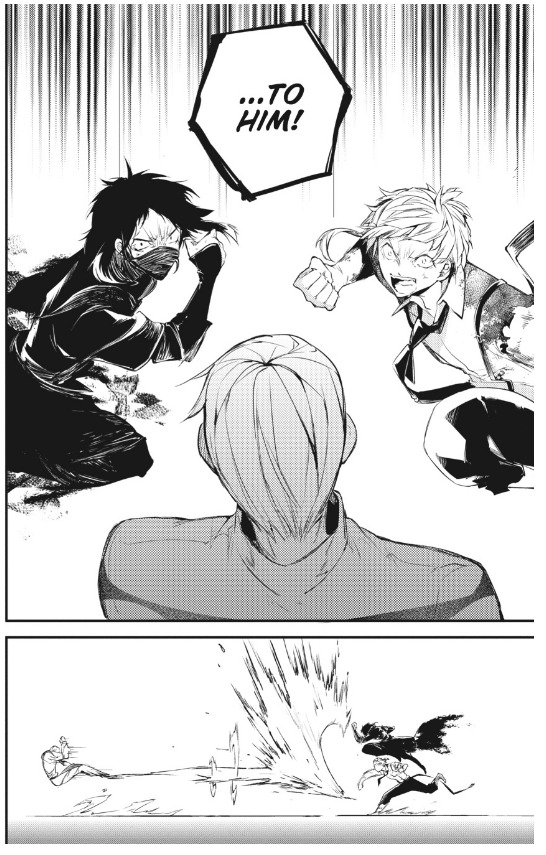
As you see, the first big arc is solved with a 3-layer integration. The same will go for the story as a whole.
In the end, Atsushi will completely control his ability, SSKK will save each other and the world and the ADA and the Mafia will work as allies.
This is also why the series is full of Jungian Trios:
Akutagawa (id), Atsushi (superego) and Kyouka (ego)
Chuya (id), Kunikida (superego), Dazai (ego)
The Port Mafia (id), Governement (superego), ADA (ego)
Aku gives in to violence and instinctive wishes and learns to control them through Atsu. Atsu represses his violent side and needs to accept it through Aku. Kyouka has experienced both shadow (the Port Mafia) and light (the ADA) and I think she will mediate between Aku and Atsu in a key moment.
Chuya's skill is the embodyment of the id (a literal God of Destruction) and he will probably grow into the Port Mafia's leader. Kunikida's skill is the embodyment of the superego (it turns idea and ideals into reality) and he will become the ADA's Director by the end. Dazai is a partner of both and will help mediate between them, so that the 2 organizations can work together.
The Port Mafia is the night, the Government is the day and the ADA is the twilight, so what stands between them. In the end, the ADA (Dazai + Kunikida) will need to mediate between the Governement (Ango) and the Mafia (Chuya). So, we have another possible Freudian Trio in Chuya (id), Dazai (ego) and Ango (superego).
These at least are my 2 cents :)
Thank you for the ask!
19 notes
·
View notes
Text
A Stoic and Epicurean narrative
Now what is stoicism? Stoicism is an ancient philosophy that flourished in Greece. It is the philosophy of forbearance (being immune) to everything that happens and also fortitude (mental courage).
Now what is Epicureanism? Epicureanism comes from Epicurus and it’s doctrine that espouses the pursuit of pleasure and avoidance of pain.
What I am going to do here is to enlarge the philosophies of Stoicism and Epicureanism with certain typologies.
Morals and Stoicism
Stoicism is a philosophy that calls for conservative moralism. Morals are virtuous and therefore a principle to emulate in society. We have to lead a life with goodness, purity and chastity. Our relations with our fellow beings should be one of Godliness. Lust and sensual pleasures are an anathema for the stoic. Sexuality is limited to the confines of the family. Pleasures have to be overlooked and sacrificed with the ritual of righteousness. Stoicism is the absence of lust. Sensual pleasures are demoted to a lower grade in the hierarchy of Stoic tenets.
Seismic Stoicism
Seismic stoicism is an arcane philosophy that conducts democratic principles for individuals and nations. War is a demotivating force and should be eschewed at all costs. An individual should live life by practicing charity and benevolence with her fellow beings. A stoic principle from the Bible is: love your enemy as yourself. Stoicism embraces the philosophy of love, peace, tolerance and nonviolence. A notable stoic is Mahatma Gandhi who with his philosophy of nonviolence freed India from the yoke of British colonialism. Stoics are altruistic helping one another in need. Seismic stoicism adumbrates a love that is Platonic.
Tectonic Stoicism
Tectonic stoicism is a mental phenomenon, a philosophy of being limited and being satisfied with what is. Tectonic stoicism curbs the excesses of passion. The ID and the Ego are wrought in chains making the superego control all emotions and feeling. The pleasures of the body are obfuscated. The stoic mind is dull and pathetic weighing pleasures and pain with stoic reverence. A stoic plucks the roots of passion and denies with existence of free will. The body of the stoic is conditioned to the desert of denial. Stoic attitude is one of mental denial and immolation, a crucifixion of passions and desires. The stoic is an orphan desperado of negation of the pleasures of life.
Now what is Epicureanism? Epicureanism is the philosophy of Epicurus which is the pursuit of pleasure and the avoidance of pain.
Here I am expanding the Freudian theory of the ID, Ego and the Super Ego.
ID
The ID is the seat of passions and desires.
Ego
The Ego is the language, culture, customs and traditions of the Society.
Superego
The Super ego is the laws and morals of the society.
My philosophy of Freudian Epicureanism is Deify the ID, Glorify the Ego and Subvert the Super Ego.
ID and Epicureanism
The ID is the seat of passions and desires and the ID is neither judgmental mental or moral. Many a time the society conditions us and makes our passions compliance with the norms of the society. The ID for the Epicurean is of deification (praise). Celebrate the ID by surrendering to passions and inhibitions. The ID is the source for all art and creativity.
Ego and Epicureanism
The Ego for Freud is the language, customs and culture inherited from the society. Society taboos the individual with its dogmas and conventions. An example can be taken from the LGBT community. The LGBT community was isolated from mainstream community until very recently. Do the institutions of the society limit freedom? The ego is celebrated with the nihilism of the society’s language, culture and traditions.
Superego Epicureanism
The superego is the laws of the society. It always acts as a limiting factor for the individual’s pursuit of freedom. For the Epicurean, the superego has to be subverted and that means circumcising the laws and following a path without getting caught. The Epicurean is a skillful acrobat who does his subversion with finesse and agility.
To conclude I would like to say stoicism is a philosophy of fortitude and forbearance and Epicureanism is the celebration of life with the deification of the ID, glorification of the Ego and subversion of the Superego.
#Anand Bose#Literature#Philosophy#Literary theory#Stoic#Epicurean#Gree#Morals and Stoicism#Seismic stoicism#tectonic stoicism#iD#Ego#superego#Id and epicureanims#Id and the ego#Id and the superego#Greek#Greece
2 notes
·
View notes
Text
Id, Ego, Super-Ego spread
I have created a Tarot spread that's fairly simple. It's three cards, and it's based on the Freudian conception of the psyche: Id, Ego, and Super Ego, with one card for each component. While Freud isn't a popular thinker among mystics, I have found that his model of the psyche, while over-simplified, does have some merit, and so I created this spread. One can do a reading using the spread on my website (Dark Pink Tarot) with a few different decks.
11 notes
·
View notes
Photo






Persona (1996)
Ely’s Take:
basically this movie is about an actress, elizabet, who forgets her lines in the middle of a performance and has a bit of a break down and stops speaking. then she gets assigned a nurse (alma) to take care of her and the Dr. Boss Lady tells alma that they can go to her home by the sea to hang out until elizabet feels better. they do that then alma opens up to elizabet about an orgy she had. then alma writes a letter to Dr. Boss Lady and alma reads it (without elizabet’s consent!) and alma starts to really be a rude bitch to elizabet. but actually!! they’re the same person. this isn’t that clear like in a Fight Club kind of way, thought. this movie was made before big reveals like that. so it’s really up for interpretation.
since im a huge carl jung girly i immediately picked up on the shadow vs. self, or unconscious vs. conscious stuff. i initially thought that elizabet represented the shadow. she’s unspeaking, visits alma at night, speaks through whispers, signs... watches scenes of horror. she is silent about her situation with her son (that she doesn’t love him), until alma figures it out. alma on the other hand is super chatty and outgoing. she just talks and talks and says whatever is on her mind. i figured she represented “the self.” she also is the one that calls elizabet out on not loving her son. also alma means “soul” in spanish.
what makes you think they’re the same person?
-always wearing the same thing/ dressed similarly
-elizabet’s husband thinks that alma is elizabet
-mirror scene
-morphing into one person scene
-scene with the same dialogue, twice
-when elizabet speaks and alma confuses it for her own thoughts and repeats what elizabet had said
so after some researching ive come to some notes
-from a freudian point: elizabet would be the id, alma the ego... and the Dr. Boss Lady, the superego. superego is basically one’s moral code. so when alma finds elizabet’s letter “ratting her out” (thought that was not her intention) to Dr. Boss Lady, she becomes hurt and angry.
-read a perspective that alma is the shadow and elizabet is the ego. i could see this in a way because elizabet is this big actress. after an embarassing moment she is forced to hang out with her shadow self, the one who had an orgy, the one who is maternal in a way that she (elizabet) could never be. alma the shadow wants to heal the self. but alma also can self-sabotage (like the glass shard incident).
a quote: Alma to Elizabet: “But your soul would be too big. It would stick out everywhere.”
anyway gorgeous movie. ive seen the seventh seal with shahak. it was a bit more simple and linear. the first scene in this film are really just flashing horrible things and it kind of reminded me of color of pomegranites. i said that to shahak when we watched, that is seemed like ingmar bergman was influinced by color of pomegranites. turns out c-o-p was released before! so maybe. it just gave a similar vibe. some great stills
2 notes
·
View notes
Text
Mindfulness: Letting go
Replacements
After completing the Freud series I was thinking a lot about how difficult it is for people to change, and I especially was thinking a lot about 'The Wolfman,' on his inability to move on and become an agent in his own life. One can be stuck in helplessness or in a victim mentality like he was for the rest of his life. Sergei Pankejeff in his later years talked about Freud's suggestion that patients must make the choice to get better. One of the ways of doing that Freud hinted in his review of Serge was the value of concentration. So much of Positive Psychology confirms that Flow states don't happen without persistent absorption. You basically have to string together one immersive task after another without too many long breaks between activities where depression and boredom can derail the momentum.
'The Wolfman' Pt. 3: https://rumble.com/v1gulsf-case-studies-the-wolfman-33-freud-and-beyond.html
Freud also talked about remorse and paying attention to desires where one can organize them based on priority. Some pleasures are poor replacements for greater desires that people find more satisfying and blameless in the long-term. Desire is a dangerous thing because if what it wants isn't available, it immediately pushes for a short-term replacement, and they are often of lesser value. Also, if you desire something that hurts oneself and or others, pleasure quickly turns into pain. Another problem is having people openly talk about how people should behave. It can easily lead to hypocrisy since normal patterns of human behaviour show that people don't follow their own rules. The mind can disagree with itself even while it's being didactic about "shoulds." It's easier to give advice than follow it. Following "shoulds" can also be inauthentic because people are only motivated by getting praise and avoiding blame. In Freudian language, it's to satisfy the Super-ego and to reinforce repression against Id desires and Ego targets for satisfaction. In other words, people behave differently only because they feel they are being watched. As soon as they are in a private life, which isn't as private anymore, the old habits return.
The Ego and the Id - Sigmund Freud: https://rumble.com/v1gvdo1-the-ego-and-the-id-sigmund-freud.html
Freud then naturally looked at desires and saw that excessive repression was very damaging and it could lead to all kinds of psychological problems like depression, and maladaptive defense mechanisms. The goal was to learn how to discharge pleasure in a way that is reciprocal and reduces remorse. Yet, it's been decades since Freud died, but his questions are still important since COVID19 lockdowns disrupted the economy. Lost jobs and crushed dreams make people precisely look for replacements. Of course, this can happen during normal times, but especially so when there is a crisis and people are depressed. Twelve-step groups point out experiences of HALT, or Hungry, Angry, Lonely, and Tired as typical precursors for an impulse to get something addictive as a replacement.
A brief search of DSM-5 addictions shows a wide variety of options: Alcohol, Tobacco, Opioids, Prescription drugs, Cocaine, Marijuana, Amphetamines, Hallucinogens, Inhalants, PCP, and many more. Addictions can also include behavioural ones: Gambling, Kleptomania, Pyromania, Food, Sex, Pornography, Playing video games, Surfing the net, and Shopping. There are also healthier types of addictions that can be rewarded in society: Workaholism, Excessive Exercise, and Spiritual Obsessions. Even pain itself can be addictive if the person is looking for the relief that happens after a behaviour like Cutting for example.
Lost Souls - Doves: https://youtu.be/dxAilm72Y4M
Many people go through one or more addictions in their lives and it creates a stigma where the person is essentially labeled based on their addiction. Much like how most names are based on some activity, work, or source of pleasure, one can be labeled permanently that way. It's like your last name changed. It's like being named Miranda Cokehead, or James Workaholic. People often don't change precisely because they take in those external labels and continue on the same behaviour patterns, along with low self-esteem. Any compassionate methods of change have to help people find a way out of these labels. Part of the problem is that society requires people to be pure, yet if you're pure, you don't need development. In reality, nobody is pure. Learning from psychopaths and narcissists, especially in person, the purity game is what they are about and they know how to dress the part and manipulate leverage. This is why they end up shocking people when they become your boss, or they marry you. You finally see the other side. But then it's too late and it takes years to extricate yourself from their sphere of influence.
The problem with labels is that they are usually misleading and don't predict future behaviour changes. Labels are only accurate if behaviour continues, but are detrimental and can trigger relapses when people have made strides towards improvement only to be shamed for past behaviour again. For example, a stigmatized person feels lonely, like part of the acronym HALT, and then looks for addictive replacements: a self-fulfilling prophecy.
Some people even want these patterns to continue because they make money off of them. If you look at the list above, a lot of our economy depends on these addictions, especially consumerism. Moderation with some of the above activities, especially behavioural ones aren't attacked by psychologists as much, but when a person's life is devoured by a single activity, then it's considered an addiction. Certainly working and exercising are healthier choices and it won't be noticed that something's wrong until a person realizes they don't know their kids, or that their excessive exercise has caused an injury.
What all these substances or activities have in common is a need to regulate emotions. How we are typically conditioned in our society is to take any bad feelings, especially stress and boredom, and to find some substance or activity that relieves anxiety, even if only there are temporary results. The problem of course is that the mind requires ever more intense substances or activities to create a reward large enough to stave off boredom, which is called tolerance. Also painful withdrawal symptoms, a biological response to the lack of the substance, propels people to keep on the addiction treadmill.
Being shameless is good for you - Marisa Peer: https://youtu.be/PBg7iSdDZBM
Healthy nihilism

Naturally, people turn to things like meditation because of all the talk of Letting Go, and all the promises of change. But even in meditation practice, the mind quickly co-opts the practice and continues in the same direction of habits and people often don't approach that tipping point of change. With Psychoanalysis, one can piece together a developmental past and there is some relief in knowing one's influences, causes, and effects. "I am this way because of these past events...I felt like garbage so I looked for replacements." Grieving about past mistakes, or missed opportunities can discharge affect by allowing oneself to feel remorse completely. When the grieving is exhausted the emotions are free to exercise more choice. Deep meditation can also banish that sense of lack for periods at a time.
All these psychological modalities help to deal with self-stigma at a basic level so that the person can still enjoy their addictions with less self-attacking, and hopefully, they may moderate their consumption, but maybe not. It's commonly called a Nihilism phase that people find very common in a person's meditation practice. There are many beautiful experiences that one can attain with Jhanas, and as the Super-ego judging begins to recede from consciousness, one can be free to enjoy conventional life without caring what people think and also what one thinks of oneself.
Concentration and mindfulness can also enhance common pleasures in life. For example, mindfulness helps to eliminate distractions when one is trying to enjoy something. The book Savoring by Bryant and Veroff talks about this benefit of being able to eliminate "Killjoy thinking." Many of us have been there where we create our own unhappiness with mental talk. Mental talk is really important because most of it is not exactly pleasant. Most mental chatter is actually one form or another of judging or complaining. Judgment releases stress, so endless judging means endless stress, and it's self-inflicted. Some good examples of negative talk the book provides involve ruining a vacation.
I was so homesick.
I worried that I would run out of money.
I took too many drugs.
The trip wasn’t as good as I thought it would be.
I drank too much.
Collapse - Aphex Twin: https://youtu.be/SqayDnQ2wmw
The Big Lebowski - The Dude meets Bunny: https://youtu.be/upUjNZRAapQ
On the positive side of nihilism, and when circumstances and the environment are cooperating, one can enjoy activities with a quiet mind and no distractions. Like in my Heraclitus video, being one with the environment and learning to appreciate can make mundane experiences become filled with a sense wonder. This comes from comparing what exists to non-existence. We didn't have to be born, and opportunities like these don't have to exist right now. In the book, they called this comparison pleasure Marveling. Some other verbs they list include basking, which is reflecting on accomplishments, and luxuriating which is enjoying physical pleasure. Luxuriating is a reminder that we do get pleasure from pleasant thoughts, but we don't want concepts to crowd out the actual experiences themselves. It's so hard to enjoy things as adults precisely because we are habitually thinking about experiences instead of actually experiencing them. It's nice to just engage in the activity and let psychological rewards happen naturally.
Heraclitus - https://youtu.be/15JZXiHsD6A
I talked about the vacation with my friends.
I took a lot of photos.
I bought gifts to bring back for other people.
I thought about how much better it was than just sitting at home.
I just went along with what was happening one day at a time.
I replayed the highlights in my mind over and over again.
Savoring was such a nice book in that you could turn to any page and find something useful. Positive Psychology books often need more examples and fewer reminders that we should try to be happy. We already know that, so what are some recommendations?
Choose experiences where there's a lower chance of failure.
Reduce distractions.
Focus your attention more on what is excellent.
Learn a skill well enough so that fear of failure decreases when using it.
Recount positive stories.
Add variety to experiences.
Add gaps in pleasure to avoid spoiling and psychological tolerance.
Share experiences with others which creates bonding and shared memories.
Enjoy pleasurable activities after going through stressful experiences.
Rehearse or journal highlights so they can be recalled later.
Compare poor experiences to even poorer ones. "Things could've been worse."
Plan experiences to reduce obstacles. Planning has a side benefit in that it also creates a pleasure in anticipating.
Celebrate important events.
Become engrossed in activities with mindfulness.
Count your blessings.
Chain positive experiences with each other. Eg. A good vacation, but an even better romance.
Planning activities that all participants can enjoy.
Remind oneself of impermanence and the limited time we all have.
Find meaningful associations. Eg. Learning something meaningful while attending a museum. Learning spiritual insights that you can take home with you.
Don't force savoring experiences with those negative judgmental thoughts. Let flavours and sensations happen and pass away naturally. Not all experiences are 100% intense and excellent. Glide with the ebb and flow by relaxing any psychological pushing or pulling. Slowing down to pay attention helps, but trying to make the sensations and flavours last longer is just another judgmental stress release that pollutes the experience. The self controls with pushing and pulling. Reminding oneself that pushing and pulling won't make flavours last longer also helps one to enjoy letting go. It's an inverse pleasure of an absence of stress. "I don't have to make it last longer."
Ibiza Spliff - Aphex Twin: https://youtu.be/NoRB6zN3ZbY
As one begins to learn about Positive Psychology and get some wisdom about how it works, there's a natural tendency to want to control life so that it conforms with happiness more. The book suggests that the social aspect can't be ignored, and negative social experiences can mar your pleasure.
Find people where enjoying pleasure around them isn't a problem.
Free yourself from activities that involve social and esteem concerns.
Give priority to close relationships.
There are also individual preconditions for savoring.
Focus on the present.
Enhance attentional focus on a positive experience.
Take control of your time.
Seek activities that engage your skills.
Become more physically active.
Get an adequate amount of sleep.
Include humor.
Journal your experiences.
What isn't highlighted in the book, or in any Buddhism that I have been taught, is that the general public has a common sense understanding that when people have many experiences as described above, it's hard for people in old age to say that they haven't lived when their life story has so many highlights. One can't do everything, but if one has done a lot, a natural thankfulness can emerge. No matter what anyone says, or is too jealous to admit, a life full of savoring is very good.
[Slo]w early morning clissold sunrise - Aphex Twin: https://youtu.be/eCFn4c1QpTM
Letting go
Where spirituality can have some points against the above pleasures is the clinging and addiction we can encounter when life gets out of balance. This is especially true when only one pleasure is emphasized over all others. It can be a problem that was long-standing for a yogi and has to be faced. Even if we enjoy alcohol, cigars, food or whatever else we like, there can be a problem with the advice above to focus on positive experience and to ignore negative experiences. You can even see a hint of it in some of the suggestions to plan to reduce the chances of negative experiences interfering with activities. You couldn't achieve that without some perception of negativity. In Buddhism, imagination and anticipation can actually be used to help practitioners gain some counterintuitive pleasures related to letting go. It's the desire for peace beyond sensual pleasure.
The late Rob Burbea had some great suggestions, and certainly, my prior video on Jhanas is a good place to start for many. We emotionally feed, and as Freud described, there is constant pressure from the Id to feed. This is partially the reason for hypocrisy because any principles people make for themselves will be subject to that libido/craving pressure. The pleasure experienced in meditation is a form of emotional feeding, except you didn't ingest any substances or engaged in any process addictions that constantly want setups and payoffs. One could use the acronym HALT and see if consistent attention to the breath with few gaps, lots of scanning the body for tension, and relaxing it, can regulate the emotions enough so that substances and process activities aren't needed. Meditation of course can take longer than a substance, but persistence here for a few minutes is often enough. Self-retreats for an hour or more can replace TV and other scatterbrained internet activities so that the brain achieves success in draining tension. When the brain is emotionally satisfied, letting go happens naturally. It's kind of like making sure you eat a meal before going shopping where food cravings would lead to restaurants, maybe alcohol, and bigger bills.
There is also the benefit of reduced conflict. If I don't have to compete for pleasure against other people, because the breath is inherently mine, and I'm going to breathe anyways, then the A part of HALT is also taken care of. Like most pleasures, we want to defend against someone else getting them, but instead, we can protect our concentration from conditioned thoughts that chip away at the benefits.
"When we talk about samadhi, that’s almost by definition a nourishing state: I’m just going to hang out in this field, in this bubble, and make it nice and warm and just as comfortable as can be, and just dwell in that, let myself rest in that and be nourished by it. Often we grasp at things and we can’t let go because our level of nourishment, the reservoir is too low... Even if it feels completely futile, over time that muscle gets – we get better at just dropping and returning. So to have faith in that. It’s kind of very, very simple."
The Jhanas: https://rumble.com/v1gqznl-the-jhanas.html
Emotional Feeding: https://rumble.com/v1gqvl1-emotional-feeding-thanissaro-bhikkhu.html
The Ego and the Id: https://rumble.com/v1gvdo1-the-ego-and-the-id-sigmund-freud.html
Rob also liked to use timelines. You're going to return to that normal state no matter what you get or achieve in the future. It's already here. Just make the trip in your mind. "We get caught in wanting this thing or that thing or this thing to unfold or that person or whatever it is, and how many times have we been through this before? How many times has it really satisfied us? So sometimes a little bit of reflection: what is this thing, what is getting this thing really going to give me? Am I really going to be fulfilled getting it? Sometimes it’s a matter of going deeper into what I want: is this thing what I really want? Do I even really want it? I’m so caught up there, but is that really what I want? What I deeply want? And recognizing it’s not what I really deeply want, there can be more ease in letting go. Sometimes it’s remembering how often in the past we’ve got what we wanted but...it ended up not being quite what we had imagined it might be before we got it. Almost always, things turn out differently than what we think. So it’s like, just bring that wisdom at the starting instead of at the end."
Many of us already have life experiences we can turn to when joining a practice like this, so it's a good reminder that we tend to return to old habits many times before a perceivable change occurs. Realistically, many people will still act on their wanting, depending on how strong their habits are, and how weak their practice is. Each individual brain is different. To move further for many people, it requires that they add more negative detail that no one wants to look at. It's a practice that many in the west try to avoid, which is to actually look for disgust and downsides to our pleasures. In Pure and Simple, Upasika Kee Nanayon makes it pure and simple indeed.
"The first requirement when you come to practice is that you need to be the sort of person who loves the truth and you need to have endurance to do what's true. Only then will your practice get anywhere. Otherwise, it all turns into failure and you go back to being a slave to your defilements and cravings just as before. When you don't contemplate yourself, how much suffering do you cause for yourself? And how much do you cause for others? These are things we should contemplate as much as we can. If we don't, we keep trying to get, get, get. We don't try to let go, to put things aside, to make any sacrifices at all. We just keep trying to get, for the more we get, the more we want...If you're going to let go of anything, you first have to see its drawbacks. If you just tell yourself to let go, let go, the mind won't easily obey. You really have to see the drawbacks of the thing you're holding onto, and then the mind will let go, of its own accord. It's like grabbing hold of fire: When you feel the heat, you let go of your own accord and will never dare grasp it again."
Stop eating roadkill - Thanissaro Bhikkhu: https://www.dhammatalks.org/Archive/y2020/200806_Stop_Eating_Roadkill.mp3
Adjust the flame - Thanissaro Bhikkhu: https://www.dhammatalks.org/Archive/y2020/200916_Adjust_the_Flame.mp3
Where your mind gravitates - Thanissaro Bhikkhu: https://www.dhammatalks.org/Archive/y2020/201019_Where_Your_Mind_Gravitates.mp3
Spiritual Bypassing: https://rumble.com/v1gpm57-spiritual-bypassing-and-inner-bonding.html
It's better to welcome the impulse, but instead of acting, only act in the imagination. The mind swirls around pleasurable details, and as expected, it ignores negative details. The swirling creates pressure to act. To move the imagery towards realistic details of costs, health consequences, and potential conflicts can turn off the craving. When the internal conflict ends, the dualism ironically allows one to regain mental peace and relax in Oneness again.
The great thing about disenchantment is that it's an authentic feeling. Instead of mimicking someone else's judgment in a Super-ego, you are following the imagery of yourself going through the pleasure-procedures and feeling the pain as if it happened to you in concrete reality. We react to fake movies, why not make realistic documentaries in your mind instead? This time you're changing not because someone told you to. People are not readily going to give you validation and a pat on the back, which is ultimately not a stable reward. Deep down the wishes and desires are trying to take out of the environment what it wants to, regardless of whether reality has enough to support those wishes. The mind can push and pull against reality, building up a sense of self in the background. "It's hard to see the drawbacks of sensual passion, but even harder to see the drawbacks of more subtle things, like your sense of self."
One of the great explainers of how to see through the sense of self is Adyashanti. One of his tests is to let go of being for or against anything and watch the mental noise decrease with equanimity. It's like a radio where the volume control can turn up or down depending on how much resistance there is. This clinging, the sense of self, is also a sensation and has to be accounted for in the cause and effect of sensations that we note in our mindfulness practice. "Somehow we've came to this conclusion, that where there is a sense of self, a sense of me, that there actually is a Me." Seeing the self as a sensation disidentifies from it because it's seen by the same awareness that notices other sensations, though albeit with more complexity that needs to be deconstructed for the different ways the self arises in thoughts and feelings. Instead of a self here noting an experience over there, all experiences can be noticed, including the Ego play-acting as a meditator. Cause and effect involve what we include as self which pushes/pulls/resists/is for, or is against, what is. The pushing and pulling, against what is very difficult or impossible to control, is what makes the intense solid sense of self. Controlling makes the sense of a Controller, but this sense of solidity is in fact a moving target that increases in tension as it resists what's here, or recedes into the background when it surrenders. Instead of a self manipulating a marionette body, the efforting, strategizing, planning, and controlling part of the mind is a natural part of the cause and effect of the Universe. The sense of separation comes from the thought construct of ME, self-measurement, and a projected self through time.
"It would almost be like...somebody spraying perfume without you even knowing it...Let's say you smell...roses...and almost immediately your first conclusion [would be] 'where are the roses?' You look around and you expect to find a dozen roses...and then you don't find [them] and then relatively quickly you realize, there are no actual roses, there's just the scent of roses." Noticing the self-belief instead as a sensation dissipates the illusion of a solid controller, which relaxes over-efforting that has always been connected with that old belief. The irony is that when you let go of the sense of a separate self, it allows you to be yourself more fully. Self-sensations are finally included with all other sensations that awareness is aware of. With letting go, human emotions are allowed, including humility, without a sense that one has to be a pure person.
Cornish Spreek5b [St. Nectan S Glen Waterfalls Mix] - Aphex Twin: https://youtu.be/H6yPLpfaGQI
Resources:
Savoring: A New Model of Positive Experience - Bryant and Veroff: https://www.isbns.net/isbn/9780805851205/
Of Hermits and Lovers: The Alchemy of Desire - Rob Burbea and Catherine McGee: https://dharmaseed.org/retreats/3383/
Pure and Simple - Upasika Kee Nanyon: https://www.isbns.net/isbn/9780861717514/
Tracy, N. (2012, January 12). Types of Addiction: List of Addictions, HealthyPlace. Retrieved on 2020, September 5 from https://www.healthyplace.com/addictions/addictions-information/types-of-addiction-list-of-addictions
Adyashanti - August 26, 2020 - https://youtu.be/heW7w3cQtDk
Contemplative Practice: http://psychreviews.org/category/contemplativepractice/
0 notes
Note
Nonono Id as in the Id from Freudian psychology
The lowest urge compared to the Ego and Superego
ooooooh that way!
that's interesting.
I wonder how they'll take it... that could be super interesting
0 notes
Text
״ the ego is required to serve [ ... ] severe masters... ״ the devil possession of asa mitaka as an expression of the struggle within the feminine subconscious : a literary analysis of the war devil as a character foil using the structural model of ego psychology. fuck sigmund fraud tho fr. all my homies hate freud
* these terms are widely considered outdated within the field of psychology.
━━ yoru is a hidden mirror image of asa's personality — an alter ego of the repressed sub – conscious, the id in freudian terms ״ the dark, inaccessible part of our personality ״ who embodies the unacceptable ideas and emotions of an emotionally repressed teenage girl within a social environment that is both hostile and emotionally unbearable.
━━ as a living fiend – hybrid of the war devil, yoru and asa have a constant inner dialogue. intrusive thoughts and violent tendencies are literally externalized into a separate entity while asa serves as the ego : ״ to conceal the id's conflicts with reality, to profess [ ... ] to be taking notice of reality even when the id has remained rigid and unyielding [ ... ] to reduce the tension and anxiety by disguising or transforming the impulses that are perceived as threatening. ״
━━ yoru and asa are literary parallels. not only do the characters of their names read as night and morning respectively, but they are opposite responses to the same struggle for women to assert their roles and desires in society. yoru is able to act with complete abandon outside the confines of cultural stigma and japanese feminine stereotypes as a separate entity from asa, but not without the associated social ramifications. ״ the ego is that part of the id which has been modified by the direct influence of the external world. ״
━━ after yoru brazenly asks out and is rejected by yoshida, asa struggles immensely with feelings of humiliation. yoru serves not only as an obstacle to asa's desire to form relationships with others, but can also be made to share in the burden of asa's social rejection : ״ [ the ego ] is concerned with self – preservation. the ego employs defense mechanisms [ ... ] denial, displacement [ ... ] dissociation, splitting. ״
━━ the power of the war devil is based in her ability to quite literally weaponize emotional ties between asa and those around her in her favor. abject sadism is not unusual for female antagonists but yoru's subjugation is tied to dominance and dehumanization rather than emotional antagonism, while maintaining the concept of ״ boundless egoism ״ as described in the article dostoevsky and parricide. neither asa nor the war devil can weaponize that which does not belong to them, inanimate object or living being, which can be seen as an expression of the anxiety experienced as a result of forming unequal attachments and rejection of the feminine subservient role within relationships : ״ there is a conflict between surrendering and loving others. ״
━━ in regards to the superego, it can be said that asa has a simultaneously overdominant but underdeveloped superego. she is burdened by guilt but not by morality itself — she has no concept of right and wrong beyond a reactionary understanding for desirable vs. undesirable outcomes. she is constantly punished by her own mind : ״ the super – ego [ ... ] is constantly watching every one of the ego's moves and punishes it [ ... ] the super – ego becomes perceptible in the state which it produces within the ego : for instance when its criticism evokes a sense of guilt. ״
1 note
·
View note
Note
I hope I don't come off as dumb with this ask, but if the girls are Id, Ego and Superego then... which one's which? Like I figure Buttercup would be the Id but idk enough about Freudian psychology to say for sure about the other two 😅
(I think I prefer soul, heart and mind also)
It was like 4am when I wrote that particular post and I think my brain was a little melted and trying to remember, “What’s that thing that they’re compared to that’s in threes?” I’m pretty sure soul, heart, and mind was the actual one I was thinking of and I’m just an idiot. 🤣 Although maybe Blossom is both ego and superego (she certainly has a super ego!) and she’s always trying the reign in the double ids of Buttercup and Bubbles.
#don’t worry I am the dumb one lmao#you can also tell by my poor choices in how I manage my sleep schedule! 🤣#blossom is that meme of the parent that's like got their two kids on those baby leashes trying to deal with them lmao
1 note
·
View note